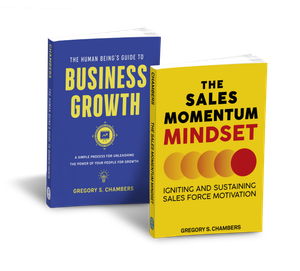
GREG'S BUSINESS GROWTH NEWSLETTER #341
Quick notes to help you grow your business in less time with less effort. . . sometime next week.
In this issue:
- Thinking about Momentum
- Being Human
- Random Stuff
Thinking about Momentum
- The tension between what you want and what life gives you is what propels you forward. It's like the old cabin board game Shoot-the-Moon. Two parallel rails inclined upwards with a steel ball resting at the lowest point. Tension is what propels the ball upwards. No tension, no movement.
- You're successful because you're talented and work hard. However, don't discount the role of chance. The ancient Romans believed the goddess Fortuna could bring luck, or withhold it. Nurture talent and reward hard work, but keep Fortuna in mind. Bad things could have happened.
- Think about luck you come across someone who has not risen above their circumstances. It is possible to work hard and have talent and never get a break. Don't look down on or pity that unfortunate soul. Things happen.
- Researches have shown you can influence luck in small ways. Like being open to serendipity. This weekend, start a conversation with a stranger. Who knows what will happen?
Being Human - Matching and Mirroring ------------------------------------------------------------
"In our recent research we found that preexisting relationships give people greater insight into how their evaluators think, reason, interpret, and process evidence. . ." – Sytch and Kim

We learn through imitation. Someone once said kids aren't good at listening to parents but never fail to imitate them. It's true. We see, we do, and it never leaves us, even in adulthood. In sales this is used as a persuasive technique. Mirror and Lead it's called.
Bullpen days
When I first started in sales in a back room bullpen, one call close type environment, one of the sales leaders was an old guy named Jerry. He loved the mirroring technique. The sale was made by prospects coming in for a presentation and the salesperson closing the deal that same night. One night I look out at Jerry trying to convince a newlywed couple to join the consumer club and I see he's sticking his leg out at a weird angle from under the table. Not only that, he's pulled up his pant leg to reveal his boot. My co-worker Dave whispers to me, "Look at Jerry. The guy is wearing boots, and Jerry is showing him he has boots too."
Pathetic, yes, but mirroring in action.
I don't teach the technique in direct sales, but I use a version of it for marketing copy critique. If your marketing copy mirrors the language of your prospect it simply works better. The research bears this out. The questions I get from marketers are, how do I find the prospect's language? All prospects talk differently, right? Does it really make a difference?
Finding the language
Getting the words your prospects use shouldn't be a burden. I tell people to start with your testimonials or the testimonials on competitors websites. If you have interviews with customers in audio or video formats, get them transcribed. If you don't have either, go get some. Customers like to talk about your products and services. Record them.
Choosing your words
As you pore through transcripts and testimonials, you'll get a feel for the language they use. From there it's just like imitating a favorite author's style. Or like the comedians doing imitations on SNL. You don't need to be exact, you just need to get the essence of how they are talking. The words your customers use are more like how your prospects talk than how your company talks.
It makes a difference
The copy your marketers come up with will not only be better, your lead generation efforts will improve. When you know how your customers approach solving the problem you helped them with, assume your next prospects will approach problems the same way. We see better leads, shorter sales cycles, and higher close rates with this approach.
An example
One more story. I helped a marketing team use this approach in lead generation for a high-end, big ticket service. As you can imagine, extremely wealthy people have a particular frame of reference, and we found some words they use by looking at luxury goods. What really sold me on this approach, however, was marketing to other side of wealth. A loan product aimed at plaintiffs waiting for settlements. If you had a big bank account this product wasn't for you because you could wait for the settlement to process. If you were desperate for cash, however, you needed this product.
The first attempts at online marketing for this product weren't converting well, and the leads coming in weren't qualified. "Sh*t" is what they told me at the time. Looking at the copy didn't show much. It was well written, the pictures were of nice couples, the colors were tasteful etc. My insight was to look at other marketing aimed at this market segment and mimic it. How did the copy and imagery compare to say, rent-to-own stores?
The marketers found the advice offensive. "Are you asking us to talk down to these people?" they said. (another problem to be addressed another time) No, I told them, this is the same as aiming your language at Ivy League educated lawyers or NBA basketball fans. Never talk down to your prospect, but always meet them where they are.
We changed the imagery, we changed the copy, and the results were immediate. Better leads, more of them, and higher close rates. The underwriters were thrilled.
You don't have to pretend to be something you're not, à la Jerry, but try to meet people where they are before attempting to lead them somewhere else.
As St. Francis says, "grant that I may not so much seek . . .
to be understood, as to understand."
Good stuff.
As luck would have it, this time I got something.
RANDOM STUFF
“If you have to ask how much it costs, you can't afford it."
– J. P. Morgan

What's your "pinch point?"
I was just watching TV and saw an old acquaintance waxing poetic about his big plans for a development. Years ago we were playing in a golf tournament. After the seeding round everyone was eating and drinking, jawing and needling, and placing ever-increasing bets on the teams in the tournament.
This was one of those hidden-rule moments for me. I was new to the country club member-guest event and didn't know what was expected besides having a good time. This was detected by the insiders, and before I knew it my dance card was filling with bets, side bets, and side-side bets. As far as I could tell I was either going to win a year of college tuition or find myself shaken down by the Omaha underworld if I didn't play well.
This is when I heard "pinch point." The user of the term was angrily eying one of the louder members of the club and I asked him what was up. I'd seen a look like that years before, late night in a bar, and when I asked my buddy what was up he told me "that's the guy." (The one who stole his girlfriend.) This was a big deal that night, even after finding out it was in fact, not "that guy." Anyway, I cautiously asked my golfing acquaintance what the look was about, and he let me know about a long-standing mini-feud he was in with the loud man. This tournament was a chance to either pull even or get ahead. He was going to do it by finally getting the guy to his pinch point.
Pinch point?
Pinch point, he said, is the dollar amount that is so high, that would hurt so much if you lost, that your asshole immediately pinches tight, and your brain shuts down. Pinch point. You know, the manly-man kind of one-upmanship you read about in books like Liar's Poker.
So now you know. So I can tell you about the day this week I looked up the prices in a resort hotel at a fancy destination wedding my daughter is invited to.
Pinch.
(on a related note, if you have time, listen to Michael Lewis read a pinch point story from Liar's Poker here: Chapter 1 So great.)
If you need to set up a time to visit, follow this link:
https://calendly.com/chamberspivot/






